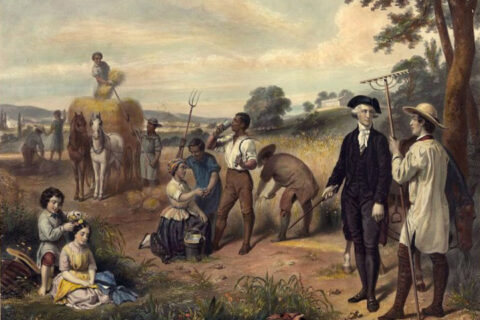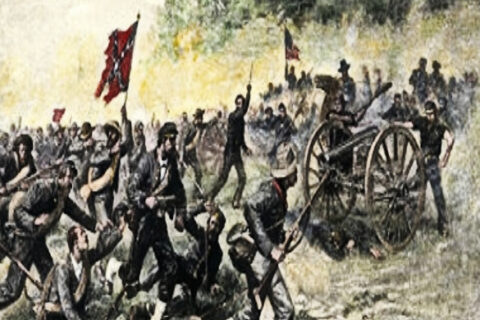In the quiet corners of our Southern heritage, where the land speaks of centuries past and tradition holds sway, the story of Anna Madgigine Jai Kingsley deserves a mention. Her life, marked by resilience, intelligence, and an indomitable spirit, stands as a testament to the rich and complex history of the South. Yet, modern narratives, influenced by Reconstructionist ideologies, often overlook her remarkable legacy.
Anna Madgigine Jai Kingsley, born around 1793 in West Africa, was thrust into a world of turmoil when she was captured by fellow black Africans and sold into slavery. She arrived in Cuba, where fate brought her into the life of Zephaniah Kingsley, a wealthy planter known for his unconventional views and complex character. Purchased at the tender age of 13, she became Zephaniah’s wife and, in 1811, a free woman.
Zephaniah Kingsley was an eccentric figure, to say the least, often speaking out about the practicalities of slavery while simultaneously benefiting from the institution. His interviews and writings reveal a man who believed in the rights of free blacks and the necessity of a multi-racial society, views that were certainly controversial for his time and remain so with those of us concerned with preserving our genetic legacy. His relationship with Anna was likely a blend of personal affection and strategic alliance, ensuring her freedom and positioning her as a significant figure in their community. Kingsley thought of himself as a pragmatist above all else. He would subsequently marry additional former slaves, forming something of a harem.
Anna’s freedom was not merely a legal status but a gateway to extraordinary achievements. She managed the Kingsley plantation on Fort George Island in Florida with remarkable acumen. Upon Zephaniah’s death in 1843, Anna inherited his estate which she maintained, slaves and all, through the War of Northern Aggression. She owned extensive lands and held slaves, navigating the social and legal intricacies of her time. Her story is not one of passive existence but of active agency and success within the societal framework of her era.
Modern historical narratives often fail to accommodate such complexity. These narratives seek to cast history in stark terms of oppressors and oppressed, a framework into which Anna Kingsley’s life does not neatly fit. As a former slave who became a slave owner, her story challenges the simplistic binaries that dominate contemporary discourse. This ideological lens tends to simplify and sanitize the past to fit modern leftist’ sensibilities. It overlooks the rich tapestry of individual experiences in favor of a monolithic view that erases the nuanced realities of our history. By sidelining figures like Anna Kingsley, this approach deprives us of a fuller understanding of the South.
The omission of Kingsley’s legacy from mainstream narratives is not just an oversight but a deliberate act of historical revisionism. It reflects a tendency to prioritize ideological conformity over historical accuracy, erasing the stories that do not fit a predetermined mold. By neglecting the achievements of individuals like Anna Kingsley, we impoverish our understanding of the past and diminish the rich history of Dixie. Her story encourages us to look beyond simplistic narratives and appreciate the full spectrum of our heritage. It reminds us that the past is not a canvas to be painted over with modern ideologies, but a tapestry of human experiences that demands our respect and recognition.
-By Jack Milton

O I’m a good old rebel, now that’s just what I am. For this “fair land of freedom” I do not care at all. I’m glad I fit against it, I only wish we’d won, And I don’t want no pardon for anything I done.






Sounds like Zephaniah Kingsley (had he been a contemporary) would have gotten along famously with Count Coudenhove-Kalergi or, in our own time, Barbara Lerner Spectre. Not the sort of company I’d choose to keep … or commend to others.
Hi German Confederate,
I did an early life check on him and he comes from Quaker stock.
I wanted to ask the author about the black guy on the back of the 2 dollar bill but I researched it myself, I haven’t got far but found out that the bill was originally issued at the start of the American civil war with Alexander Hamilton on the Yankee note and Judah p. Benjiman (sp?) On the confederate note. Thought I’d share that here.
God Bless and keep you Sir and all here at ID
Thanks Outside Looking In. One would hope we’d all be Blood & Soil nationalists (those Ben Shapiro calls ‘garbage’), but I’ve learned otherwise. I know I can count on you.
I didn’t mean to reply my edit to you German Confederate.
13 states moving forward in time, each a nobility unto itself, 13 Christian and cultural identities. 13 tribes seeking self determination. That would have been the healthiest way forward. Talk about arrested development.
God Save the South!
Edit: Confederate